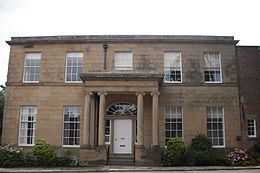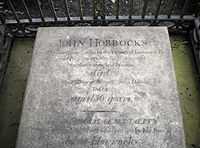John Horrocks (politician)
John Horrocks (27 March 1768 in Edgworth, Lancashire, England – 1 March 1804 in London) was a British cotton manufacturer and Member of Parliament for Preston.
Early life
He was the youngest of two surviving sons in a family of eighteen children. His father, a Quaker, was a relatively prosperous manufacturer of high-quality stone printing tables for textiles in Edgworth.
Career

David Hunt in his 1992 History of Preston reports that many details of his early life are confused. The Lancashire cotton industry was then in its infancy, but Horrocks was greatly impressed with its future possibilities, and he managed to obtain a few spinning-frames which he erected in a corner of his father's offices. For a time he combined cotton-spinning on a very small scale with stone-working, but finally devoted himself entirely to cotton-spinning, working the frames with his own hands, and travelling through the Lancashire manufacturing districts to sell the yarn.
His goods obtained a reputation for quality, and his customers increased so rapidly that about 1791 he moved to Preston, where he began to manufacture cotton shirtings and long-cloths in addition to spinning the cotton yarn. He took full advantage of the machinery invented for manufacturing textiles. By rigidly maintaining the quality of his goods and rapidly developed his business. He was aided by a local banker, who became a partner. Within a year of his arrival in Preston he built his first large mill. Shortly after he obtained a monopoly of the manufacture of cottons and muslins for the Indian market from the British East India Company. Demand for Horrocks's goods continued to increase, and to cope with the additional work he took first an elder brother and in 1801 a Mr Whitehead and a Mr Miller into partnership, the title of the firm being altered to Horrockses, Miller, & Co.
In 1794, Horrocks was chosen as a burgess and served as Town Bailiff in 1794-5. He was elected as a council member in 1796 and became an Alderman in 1799. In 1802, he entered parliament as Tory member for Preston, having stood unsuccessfully in 1796. He died of brain fever reportedly resulting from over-work. During his 13 years in Preston he amassed a personal fortune of at least £150,000, and set the foundations for the Horrocks/Miller mill owning dynasty that dominated Preston into the mid nineteenth century.
In 1801 Horrocks built "The Lodge" (later called Penwortham Hall) in Penwortham as a residence for himself. The property, which is a Grade II listed building, is today used as a series of private dwellings.[1] He died in 1804 and was buried at St Mary's Church, Penwortham.

References
- Leigh Rayment's Historical List of MPs See: Plymouth to Putney (including Preston).
 This article incorporates text from a publication now in the public domain: Chisholm, Hugh, ed. (1911). Encyclopædia Britannica (11th ed.). Cambridge University Press.
This article incorporates text from a publication now in the public domain: Chisholm, Hugh, ed. (1911). Encyclopædia Britannica (11th ed.). Cambridge University Press.
External links
| Wikimedia Commons has media related to Penwortham Hall, Lancs. |
- Hansard 1803–2005: contributions in Parliament by John Horrocks
| Parliament of the United Kingdom | ||
|---|---|---|
| Preceded by Sir Henry Philip Hoghton, Bt. Edward Smith-Stanley |
Member of Parliament for Preston 1802–1804 With: Edward Smith-Stanley 1796–1812 |
Succeeded by Edward Smith-Stanley Samuel Horrocks |